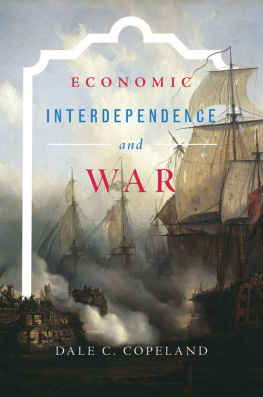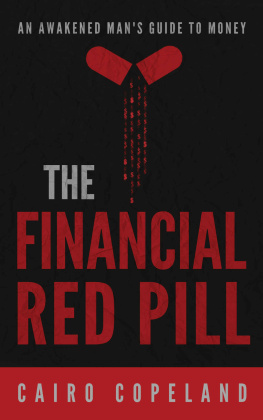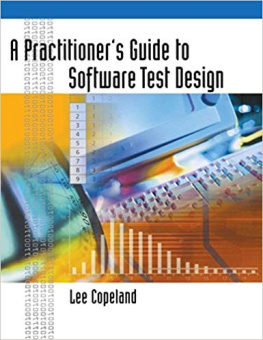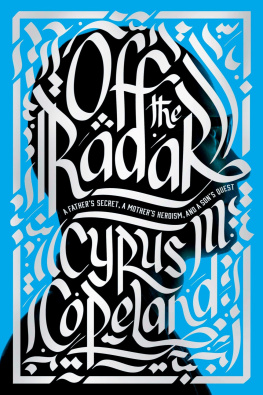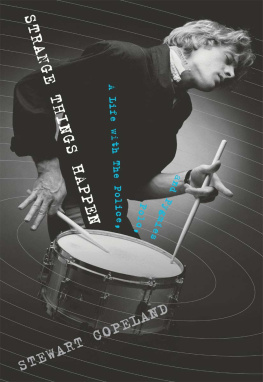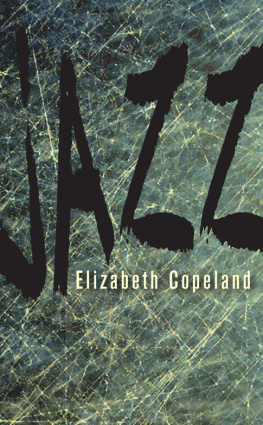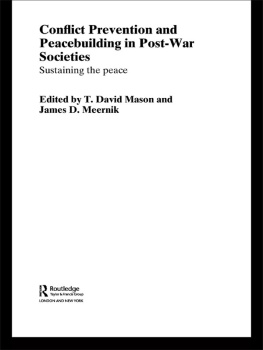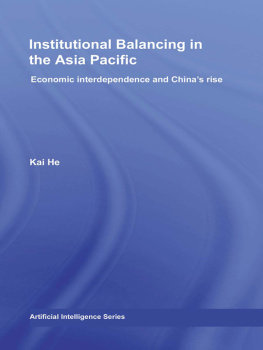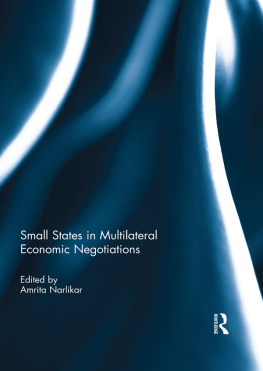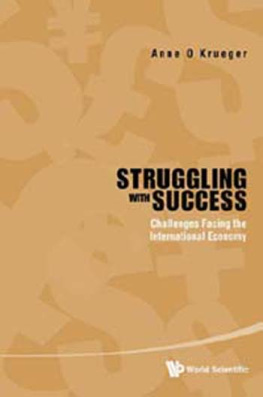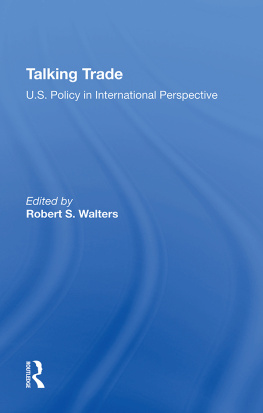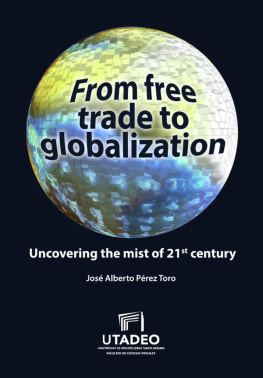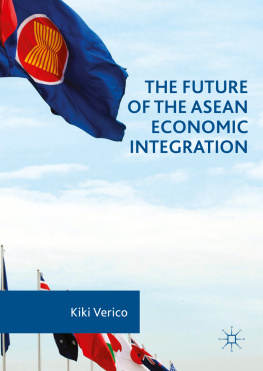
Economic Interdependence and War
PRINCETON STUDIES IN INTERNATIONAL HISTORY AND POLITICS
Series Editors
G. John Ikenberry, Marc Trachtenberg, and William C. Wohlforth
Recent Titles
Economic Interdependence and War by DALE C. COPELAND
Knowing the Adversary: Leaders, Intelligence, and Assessment of Intentions in International Relations BY KEREN YARHI-MILO
Nuclear Strategy in the Modern Era: Regional Powers and International Conflict BY VIPIN NARANG
The Cold War and After: History, Theory, and the Logic of International Politics BY MARC TRACHTENBERG
Liberal Leviathan: The Origins, Crisis, and Transformation of the American World Order BY G. JOHN IKENBERRY
Worse Than a Monolith: Alliance Politics and Problems of Coercive Diplomacy in Asia BY THOMAS J. CHRISTENSEN
Politics and Strategy: Partisan Ambition and American Statecraft BY PETER TRUBOWITZ
The Clash of Ideas in World Politics: Transnational Networks, States, and Regime Change, 15102010 BY JOHN M. OWEN IV
How Enemies Become Friends: The Sources of Stable Peace BY CHARLES A. KUPCHAN
1989: The Struggle to Create PostCold War Europe BY MARY ELISE SAROTTE
The Struggle for Power in Early Modern Europe: Religious Conflict, Dynastic Empires, and International Change BY DANIEL H. NEXON
Strong Borders, Secure Nation: Cooperation and Conflict in Chinas Territorial Disputes BY M. TAYLOR FRAVEL
The Sino-Soviet Split: Cold War in the Communist World BY LORENZ M. LTHI
Nuclear Logics: Contrasting Paths in East Asia and the Middle East BY ETEL SOLINGEN
Social States: China in International Institutions, 19802000 BY ALASTAIR IAIN JOHNSTON
Appeasing Bankers: Financial Caution on the Road to War BY JONATHAN KIRSHNER
The Politics of Secularism in International Relations BY ELIZABETH SHAKMAN HURD
Unanswered Threats: Political Constraints on the Balance of Power BY RANDALL L. SCHWELLER
Producing Security: Multinational Corporations, Globalization, and the Changing Calculus of Conflict BY STEPHEN G. BROOKS
Driving the Soviets up the Wall: SovietEast German Relations, 19531961 BY HOPE M. HARRISON
Economic Interdependence and War
Dale C. Copeland
PRINCETON UNIVERSITY PRESS
Princeton and Oxford
Copyright 2015 by Princeton University Press
Published by Princeton University Press, 41 William Street, Princeton, New Jersey 08540
In the United Kingdom: Princeton University Press, 6 Oxford Street, Woodstock, Oxfordshire OX20 1TW
press.princeton.edu
Jacket art : Auguste tienne Franois Mayer, The Redoutable at the Battle of Trafalgar , 1836.
Photo: Bulloz. Muse de la Marine, France. RMN-Grand Palais/Art Resource, NY
All Rights Reserved
ISBN 978-0-691-16158-7
ISBN (pbk.) 978-0-691-16159-4
British Library Cataloging-in-Publication Data is available
This book has been composed in Sabon Next LT Pro
Printed on acid-free paper.
Printed in the United States of America
10 9 8 7 6 5 4 3 2 1
Preface
T HIS IS A BOOK with multiple layers, and hence one that can be read from a number of angles. First and foremost, it is exploration of the conditions under which trade and investment flows are likely to push great powers either toward peace or toward militarized conflict and war. At another level, however, it is an investigation into the ways great powers think about economic exchange, and the role it plays in their efforts to build global power and long-term security. Finally, the book constitutes a study of the relative causal salience of commercial versus noncommercial forces in the movement of modern world history. In the latter sense, it is part of a larger effort to determine just how often competing theories of war, both economic and noneconomic, effectively explain shifts from interstate peace to dangerous crises and war, or from ongoing cold wars to stable peace. By covering the essential universe of great power cases from 1790 to 1991, the book provides the first major test of the relative importance of competing causal factors across the sweep of diplomatic history. The findings of this book should thus be of interest to historians as well as international relations scholars. Yet by also considering the cutting-edge work of quantitative scholars, the study shows the larger implications of the books argument for a broad cross-section of nations, both large and small.
Because the attempt to cover two hundred years of great power history makes for a long book, different audiences will want to read this work in different ways. Readers with a primary interest in international relations theory and political science will want to explore the first three chapters carefully, and then pick and choose cases of particular interest from to cover the cases of the tumultuous twentieth century.
Like its subject matter, this is a book with a long history, and there are many people to thank. I first want to express my appreciation to those individuals who offered comments at workshops on early versions of individual chapters, and whose names I may not have known at the time or have subsequently forgotten. This includes workshops at the Center for International Affairs at Harvard University, the Belfer Center for Science and International Affairs at Harvard, the Program on International Peace, Economics, and Security at the University of Chicago, the Mershon Center at Ohio State University, the departments of political science at Columbia University and George Washington University, and the Department of Government at Georgetown University. I especially want to thank the Lone Star Forum, a consortium of Texas universities, for a weekend setting that facilitated a fertile discussion of key sections of my close-to-finished manuscript. The comments from the participants there helped me fix a number of errors just before the manuscript went out for review.
For helping me work through the bugs in the original theoretical setup, I wish to thank Bob Art, James Fearon, Hein Goemans, Andrew Kydd, Jack Levy, Charles Lipson, Michael Mastanduno, John Mearsheimer, Ido Oren, Duncan Snidal, and Stephen Walt. For valuable advice on specific chapters and my methodological approach, thanks go to Deborah Boucayannis, Tim Crawford, Mike Desch, Dan Gingerich, Eugene Gholz, David Leblang, Jeff Legro, Steven Lobell, Allen Lynch, Ed Mansfield, Kevin Narizny, John Owen, Sonal Pandya, Norrin Ripsman, Len Schoppa, Herman Schwartz, Randy Schweller, Todd Sechser, Jeff Taliaferro, David Waldner, and Brantly Womack. At the University of Virginia, I was fortunate to work with a number of smart graduate students who offered incisive comments at various stages of this books development: Karen Farrell, Kyle Haynes, Derek King, Kyle Lascurettes, Tom Moriarty, Carah Ong, Joseph Riley, Matt Scroggs, Yu Jin Woo, and Brandon Yoder. Here I especially offer my gratitude to Michael Poznansky for his penetrating critiques across many of the books chapters.
At Princeton University Press, I greatly appreciate the help of Marc Trachenberg and John Ikenberry, editors of the Princeton Studies in International History and Politics series, for their strong support of this project from the get-go. Eric Crahan and his forerunner, Chuck Myers, were everything one could want in a general editor. I must also thank John Haslam of Cambridge University Press for his support during the review process. Although an author can (unfortunately) only publish a book with one press, Johns sustained encouragement and interest in the project will always be remembered.
Finally, I want to acknowledge the anonymous reviewers at both Princeton University Press and Cambridge University Press for extensive as well as constructive comments. Their insightful suggestions helped me correct a number of flaws, leading to what I hope is now a much-improved final product. One of these reviewers, who later revealed himself to be Frank Gavin, provided especially helpful thoughts on the broader diplomatic-historical implications of the project.
Next page
